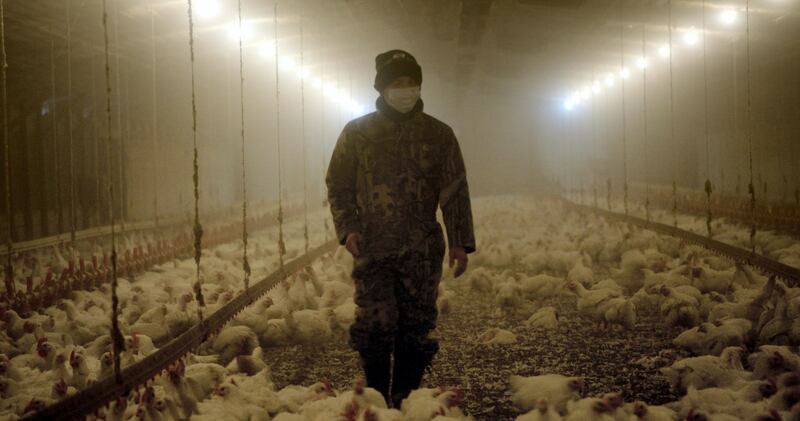Sometimes the truth is hard to swallow – and quite literally so – in Rotten, a Netflix documentary series that gives food production the true-crime treatment that will lead you to never look at your dinner plate in the same way again.
Whether you prefer to dine out in gourmet luxury, eat franchise burgers or cook nutritious meals at home, there's more than enough scandal here – and impact on your well-being – to plant unease in the pit of your stomach.
"Rotten dives deep into the food production underworld to expose the corruption, waste and real dangers behind your everyday eating habits," according to Netflix.
“In a world where huge global supply-chains are increasingly intertwined and consolidated, this series starts on your dinner plate... and follows the money to the shocking consequences – intended or not – of regulation, innovation and greed.”
The series hails from people who know the ins and outs of engaging foodie television – Zero Point Zero, the production company behind Anthony Bourdain: Parts Unknown (2013-present), a five Emmy-award winner that follows gallivanting gastronome Bourdain as he experiences cultures and cuisines around the world. It has also produced the long-running series The Mind of a Chef, which combines travel, cooking, history and science as chefs share their recipes and philosophies on the culinary arts.
The sobering, critical trailer for Rotten wastes no time in sinking its teeth into the issues, as it warns us at the opening salvo: "The food industry is under full-scale assault. The crisis is global."
Rightly or wrongly, other ominous warnings include: "Our bodies are rejecting the food we eat, and even the experts don't really know why." Some of our favourite foods go under the microscope in the six episodes:
Lawyers, Guns and Honey reveals in the opening episode that things are not so sweet in the global honey business, as the programme explores the largest food fraud investigation and prosecution in history – a scam known as "Honeygate" – in which United States Customs busted a honey-smuggling ring.
Leading honey producers in the United States smuggled in inferior honey from China via Australia, not to mention other substances found in it.
The Peanut Problem takes us beyond the surface shell game to explores the surge in people suffering from severe food allergies over the past two decades.
This episode looks at the growing body of science around our physiological changes and tolerances, as well as the accountability of restaurateurs in caring for their most vulnerable customers.
Garlic Breath spices up the proceedings as it presses forward with a look at the lucrative and controversial trading relationship between the US and China. It turns out that this is merely the wrapper for a David-and-Goliath tale of loyalty, betrayal and revenge on the US garlic scene.
Don't pin your hopes on the family farm to save you either. Big Bird ruffles corporate feathers with a behind-the-scenes look at chicken farming. From the lowliest hen to the richest magnate, the size and scale of chicken-growing has determined the fate of every player in this expansive food chain.
Milk Money may leave a sour taste in your mouth with its look at how a thirst for higher profits has driven some dairy farmers to switch over to producing upscale organic milk, or even "raw" unpasteurised milk, but it all comes with the risk of pathogens which, most unfortunately, can sicken or even kill you.
Cod is Dead may be a whimsical title, but there's nothing funny about how, in the wake of overfishing in New England, the US government stepped in to regulate and save its fisheries. Things didn't go quite as planned as the unintended fallout – a wave of consolidation across the industry – set the stage for massive criminal exploitation.
______________________
Read more:
[ How veganism can save the planet ]
[ World Vegetarian Day: the social and environmental reasons why people are giving up meat ]
[ Vegetarians are saving the world. Why aren't they better catered for when they travel it? ]
______________________
As it pores over corruption, fraud and death along with our edibles, Rotten is sure to influence how we feel about the ethics of the meat industry and beyond, and perhaps cause us to reconsider our food choices, armed with this new knowledge.
While Netflix never reveals its viewership ratings, the true-crime genre must obviously be generating some impressive numbers for the streaming company, as it builds upon earlier hits like The Keepers, about the unsolved murder of a nun in Baltimore in 1969; Making a Murderer about a wrongfully convicted Wisconsin man who served 18 years in prison; the true-crime satire American Vandal; and Mindhunter, a period drama that traces the FBI's early attempts to get into the minds of criminals as it developed the science of profiling.
Next up for Netflix in this arena is Dirty Money, an investigative series from Academy Award-winning director Alex Gibney, which will deliver an up-close and personal view into untold stories of scandal and corruption in the world of business, from January 26. First-hand stories from the victims and perpetrators will be featured in each episode.
Rotten is available for streaming on Netflix from January 5





